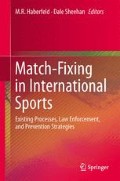Abstract
The recommendation of match fixing prevention strategies presumes a thoughtful understanding of the actors involved and the dynamics of the events and also of the specific functioning of the legal and sports institutions of each local context. In this chapter we consider the development of an academic agenda about match fixing in Brazil by discussing the Brazilian institutional architecture and its capacity to fight and prevent match fixing, including ordinary Justice System and Sports Justice institutions. To illustrate it, we explore three famous examples of match fixing events occurred in Brazilian soccer and the official reactions. The main goal of the chapter is to bring about policy recommendations at the light of the existing literature findings, in relation to Brazilian context and its institutional debilities. By doing this, we intend to identify a possible field of studies that could be carried out by Brazilian academe and deficient areas that should receive intellectual investment.
Access this chapter
Tax calculation will be finalised at checkout
Purchases are for personal use only
Notes
- 1.
The International Police Organization – Interpol – indicates that the illegal betting market in Asia alone is worth up to 500 billion dollars.
- 2.
Brazilian law broadly define corruption as a kind of fraud – a malpractice in the criminal, civil or procedural field, by deception or bad faith, with the goal of prejudicing the state or third parties or to flee the performance of an obligation.
- 3.
The collected data included information on referees’ and linesmen’s personal characteristics and career paths; their decisions during each match was obtained from the websites and printed editions of Italian daily newspapers; referees’ and linesmen’s grades were collected from the official evaluations provided by the Italian Referee Association; the Team Performance Index, IVS, obtained by the Panini group; the list of the matches being rigged drawn from official judicial records (Boeri and Severgnini 2011: 350).
- 4.
References
Boeri and Severgnini (2011). Match rigging and the career concerns of referees. Labour Economics, 18, pp. 349–359.
Comissão Parlamentar de Inquérito (2001). Relatório Final da CPI “destinada a investigar fatos envolvendo as associações brasileiras de futebol”. Vols. I, II, III, IV and Anexes. Brasília, Senado Federal (in Portuguese).
Carlos Azevedo e Aldo Rebelo (2002). A Corrupção no futebol brasileiro. Motrivivência, N. 17, pp. 1–18 (in Portuguese).
Folha de S. Paulo (2000). Dados da CBF revelam empobrecimento jogador nacional. Edition of 02/29/2000. (in Portuguese).
Hosmer-Henner, Adam (2010). Preventing Game Fixing : Sports Books as Information Markets. Gaming Law Review and Economics. Vol. 14, N. 1, pp. 31–38.
Marques, Gutierrez, Montagner (2009). Novas configurações socioeconômicas do esporte contemporâneo. Revista da Educação Física da UEM. v. 20, n. 4, pp. 637–648 (in Portuguese).
Mineps (2012). 5th International Conference of Ministers and Senior Officials Responsible for Physical Education and Sports. Comission III Recommendations on ‘Preserving the integrity of sport’.
Placar (2005). Dossiê do Apito: tudo sobre a máfia que anulou jogos do Brasileirão-2005. Edition of 3/3/2011 (in Portuguese).
Preston and Szinmanski (2003). Cheating in Contests. Oxford Review of Economic Policy, vol. 19. N. 4, pp. 612–624.
Rebeggiani, Luca (2009). The Liga Portuguesa decision of the European Court of Justice – An Economist View. Rivista di Diritto ed Economia dello Sporte, vol.5, 3, pp. 111–122.
Scoppa, Vincenzo (2008). Are subjective evaluations biased by social factors or connections? An econometric analysis of soccer referee decisions. Empirical Economy N. 35, pp. 123–140.
Van Meegen (2012). Preventing Match Fixing: Contemporary Approach. Global Academic Experts – Meeting for Integrity in Sports.
Author information
Authors and Affiliations
Corresponding author
Editor information
Editors and Affiliations
Rights and permissions
Copyright information
© 2013 Springer International Publishing Switzerland
About this chapter
Cite this chapter
Godinho, L., Barbosa, C. (2013). Topics for an Academic Agenda: The Prevention of Match Fixing in Brazil. In: Haberfeld, M., Sheehan, D. (eds) Match-Fixing in International Sports. Springer, Cham. https://doi.org/10.1007/978-3-319-02582-7_12
Download citation
DOI: https://doi.org/10.1007/978-3-319-02582-7_12
Published:
Publisher Name: Springer, Cham
Print ISBN: 978-3-319-02581-0
Online ISBN: 978-3-319-02582-7
eBook Packages: Humanities, Social Sciences and LawSocial Sciences (R0)

